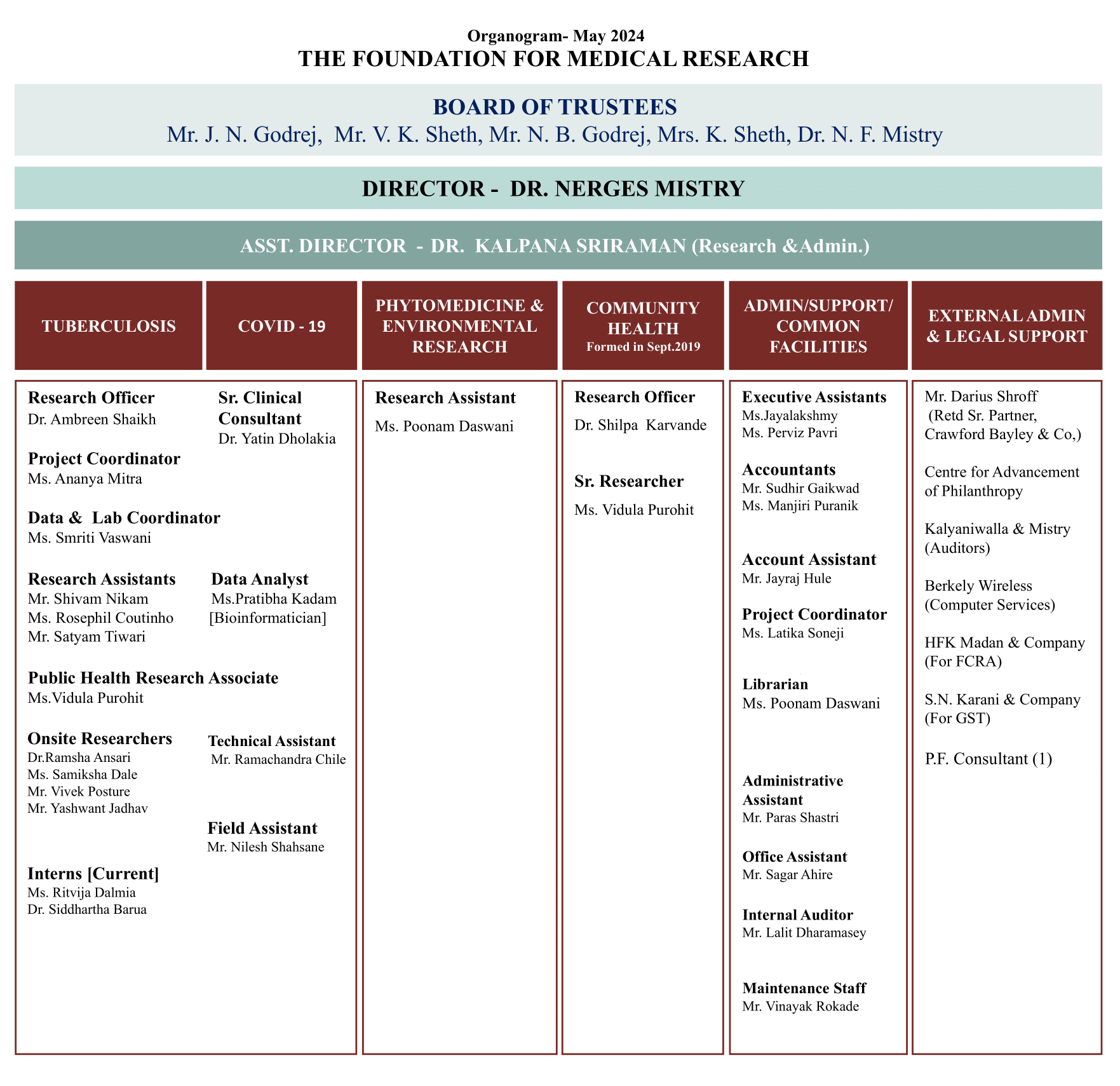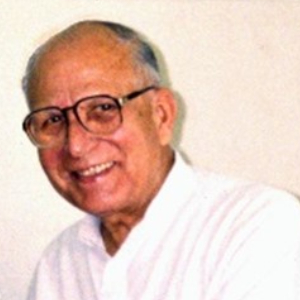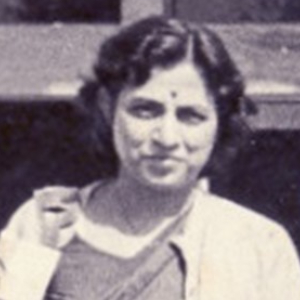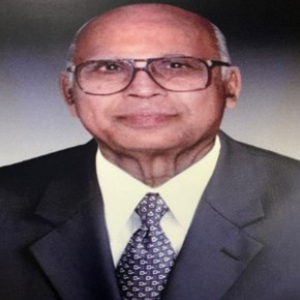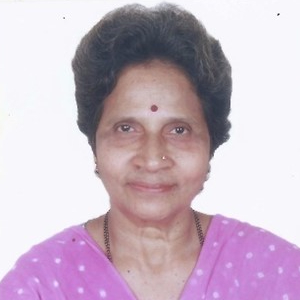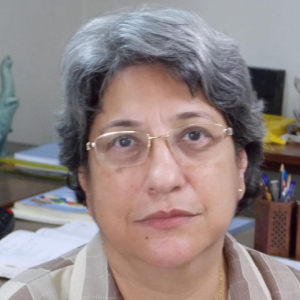

Dr. Nerges Mistry
Director
Dr. Nerges Mistry is the Director of the Foundation for Medical Research (FMR), Mumbai and the Foundation for Research in Community Health (FRCH), Pune.
A microbiologist and immunologist by training from the University of Mumbai, and the University of Birmingham, UK, Dr. Mistry's work is a convergence of both laboratory and field studies in infectious disease, non-communicable disease and health system strengthening.
Over the last 2 decades her focus has been on studying the molecular epidemiology of drug resistant tuberculosis and in deriving knowledge on transmission of airborne pathogens like TB and COVID-19.
Using contemporary technologies like whole genome sequencing, FMR contributed to the identification of drug resistant mutations in Indian clinical strains and participated in the strengthening of the TB public sector laboratories in harnessing the technology for the first time for TB surveillance in India. Knowledge in transmission is also being pursued for devising non-invasive diagnostic test approaches for diagnosis of pediatric TB.
Dr. Mistry has also a keen interest in convergence of non-medical approaches for TB control and prevention including nutrition, pollution, housing and community engagement. She has engaged in a Gates Foundation supported patient pathway studies to evaluate the efficacy of private provider engagement strategies in Mumbai and Patna. She was an active Member of the Mumbai Alliance against TB and has participated in a number of advocacy measures for comprehensive approach to TB prevention and control.
In the field of community medicine, Dr. Mistry has had experience in the development of a community-based health care system and intervention research in the management of drinking water in rural communities. A recent undertaking is the correlation of water quality and climate change in rural communities from drought prone areas. She has had considerable experience in development and evaluation of community-based health care systems in rural areas particularly in the field of NCDs and is a strong votary for a career path for primary care workers and the induction of quality care in public health system in rural areas. She also worked along with NICE International UK to instil quality of care measures through development of clinical practice guidelines.
Dr. Mistry has over 105 publications in peer-reviewed journals and has been a principal investigator of over 42 major projects. Her recent projects reflect a combination of biosocial approach to problems. Dr. Mistry was awarded the Heiser Fellowship from the USA for her postdoctoral research work which she undertook at the University of Oslo in 1984-1986. Dr. Mistry has held advisory positions in the University of Mumbai and academic institutes in Mumbai like Cancer Research Institute (CRI) and Bhabha Atomic Research Centre (BARC). She is a guide for post-graduate degrees in Applied Biology from the University of Mumbai and has guided 11 post-graduate and doctoral research students. Recently she served as a Mentor for training of women scientists through USAID PEER Initiative.
She is also a member of the ASHA Mentoring Group of the National Rural Health Mission ever since its inception and has been on the Advisory Group for Community Processes and Traditional Medicine for the 11th and 12th Five Year Plan, Govt. of India. She was also a member of the National Technical Expert Group on Diagnosis of TB under NTEP and also serves as an Expert on the Global Coalition Against Tuberculosis (GCAT) and is an Advisor to the TB PPM Learning Network.

Dr. Kalpana Sriraman
Assistant Director
Dr. Kalpana Sriraman is the Assistant Director of Research and Administration at the Foundation for Medical Research. She completed her PhD in Biotechnology from the Indian Institute of Technology-Madras and has more than 12 years of research experience post her PhD. Kalpana is a molecular biologist at the core but has diverse research experience in microbial biotechnology, mammalian biology and infectious diseases. At the Foundation, she works in the area of tuberculosis (TB) and COVID-19. In TB, her main research focus area is the molecular biology of tuberculosis disease with a specific focus on drug resistance, diagnosis, transmission and host-pathogen interactions. Her initial research focused on understanding molecular changes associated with the rapid acquisition of multi-drug resistance in Mycobacterium tuberculosis.
Her recent and current research include- a) development of mask-based capture of respiratory aerosols of TB patients and RT-PCR assays for applications in diagnosis of pediatric and adult TB, b) understanding the effect of treatment on infectiousness of aerosolized bacteria at molecular level, c) test industrial compounds for anti-TB activity. On the host-pathogen side, her research interests include understanding host-bacterial determinants of TB transmission, the interaction between malnutrition and TB disease and site-specific determinants of extrapulmonary TB. In COVID-19, her research focusses on the application of mask-based capture of patient respiratory aerosols for understanding individual risk of transmission of SARS-CoV2 and the impact of interventions like vaccination on transmission risk. She also handles biosafety aspects at the Foundation.

Dr. Shilpa Karvande
Senior Research Officer
Dr. Shilpa Karvande- Senior Research Officer- FMR. She is an anthropologist and public health researcher by training. She has completed her Ph.D. in Public Health from University of Basel, Switzerland in 2009. She has international training experience (of more than 10 years) to students and researchers on subjects such as developing research projects, research methodology, tools of data collection, operations research, monitoring and evaluation tools etc. She has more than 25 years of public health research experience. Her core interest areas are health system strengthening, quality of healthcare, maternal and newborn health, communicable and non-communicable diseases and research ethics.
She is currently an awardee of a seed grant as a mentor in Women in Science Mentorship Programme by USAID- National Academy of Science, USA in the area of research in Tuberculosis. She has several peer reviewed research publications and presentations in national and international conferences to her credit.

Dr. Ambreen Shaikh
Senior Research Officer
Dr. Ambreen Shaikh received her PhD in Applied Biology from National Institute for Research in Reproductive Health, Mumbai University where she worked on characterization and function of embryonic-like stem cells present in cord blood and bone marrow. She joined the tuberculosis department at the Foundation in 2017 for her post-doctoral training and currently, is a Senior Research Officer here. At the Foundation, she has worked on mask-based patient aerosol sampling for TB and COVID-19 detection and understanding the impact of COVID-19 vaccination on individual disease transmission risk. She has also used bacterial transcriptomics and invitro studies to understand how TB treatment affects the infectiousness of the bacteria. Currently her work is focused on optimizing the mask-based sampling combined with molecular assay to detect pediatric TB.
She has had opportunity to diversify and study shifts in respiratory microbiome post TB treatment as well as COVID-19 genomics. Her research interests are in gaining insight into TB pathogenesis at multiple levels by studying small non-coding mycobacterial RNAs and host gut-lung microbiome. Her areas of research include cell and molecular biology, infectious diseases and biochemistry. She has authored and co-authored 15 publications and at the Foundation is a member of Institutional Research Ethics committee and Institutional Complaints Committee.
